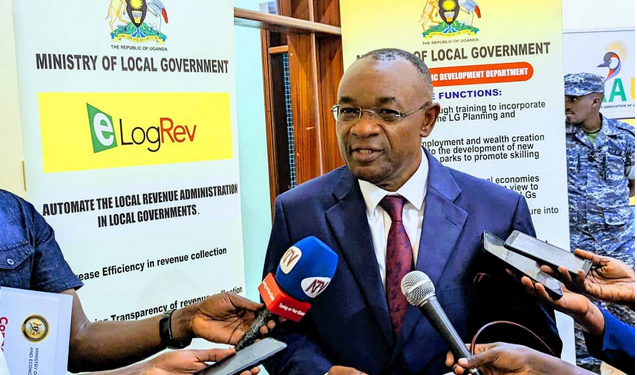By CHIMPREPORTS
The Minister of Local Government, Raphael Magyezi, has revealed that all the 10,594 Parishes, including those in Karamoja Subregion, have received funds for the Parish Development Model (PDM).
PDM, which is a Government-poverty-eradication-and-job-creation programme, launched by President Museveni in February 2022, aims to boost household incomes as well as the development of microenterprises.
The Programme aims to help people from the parish level to increase their household incomes and joining the money economy. It is an extension of the whole of government approach to development, as envisaged under the National Development Plan III, with the parish as the lowest administrative and operational hub for delivering services closer to the people, and hence fostering economic development.
PDM seeks to lift Uganda’s population from the subsistence to active participation in the money-economy, and encompasses seven pillars that include; Production, Storage, Processing and Marketing; Infrastructure and Economic Services; Financial Inclusion; Social Services; Mindset change; Parish Based Management Information System; and Governance and Administration.
In its maiden year, 2021/22 financial year, the Government sent 17 million shillings to each parish as revolving fund under PDM. The money was sent to organized groups at Parish level, and those groups lent the money in form of loans to their members at low interest rates.
In the following fiscal year 2022/23, the government increased the 17 million to 100 million shillings per parish.
Under the plan, 100 million shillings would be sent directly to the Sacco-Accounts in each parish, from which households borrow and invest in income-generating activities.
Minister Magyezi says the Government has so far dispersed a total of 1.43 trillion shillings to all districts under PDM-Programme.
Magyezi, who on Friday was meeting District Chairpersons and Mayors of Cities and Municipalities in Kampala, called on local government leaders to monitor the PDM funds to ensure success of the program.
“I am excited that this Meeting with District Chairpersons, City- and Municipal Mayors has finally taken off very well. Let’s make sure that every quarter, we have this meeting to find solutions to improve service delivery. Parish development model is for all of us. District leaders make sure you monitor your funds. We achieve together. The success of the government depends on your dedication and leadership of the top district leadership. These are the 176 Chairpersons, City and Municipal Mayors,” he said.
Magyezi described the disbursement of PDM-funds and the number of beneficiaries as a remarkable progress, given the short time the program has been under implementation.
He noted the government will build on PDM to lift Ugandans trapped in the subsistence-to-money-economy, a move that President Museveni has repeated overtime.
“PDM is important to us because we want to use it as a strategy of the government to lift the remaining 39 percent out of subsistence to the monetary economy. Our call and target is that in the next 4-5 years, all the households should be earning at least 20 million shillings per annum,” he said.
He noted that Uganda presently has approximately nine million households, and the government targets 3.5 million of them under the PDM-Programm.
“This year, we are close to one million. I am hopeful that we shall reach our target and, therefore, urge you to remain champions of PDM and make sure every necessary resource and capacity is built and is geared towards success,” Magyezi told local government leaders.
The Executive Director of the Advocates Coalition for Development and Environment (ACODE), Dr Arthur Bainomugisha called on local government leaders to settle disputes and adopt PDM for the nation’s benefit.
Dr Bainomugisha noted that in ACODE’s research across 35 districts, it was found that conflicts among political leaders were identified as a significant issue, potentially contributing to sluggish service delivery in various districts.
“Even if you get the money, you may not make progress well with rampant conflicts,” he said.
Bainomugisha, who also hinted on the Decentralization Policy, reminded the local governments that the policy empowers them to “exert horizontal and vertical accountability to the centre (central government)”.
“You are not supposed to beg the centre. You are supposed to be autonomous, both financially and politically.“
He, however, added that, due to insufficient funding for local governments and their heavy dependence on the central government for budgets, this ideal scenario is not materializing. He stressed the necessity for interventions to boost their finances so that they fulfill their crucial role as primary drivers of service delivery.
The Permanent Secretary for the Ministry of Local Government, Ben Kumumanya said, “the incremental funding for Local Governments has increased, but not for the governance component. If we succeed in the digitalisation of the revenue collection, some percentage of the collections can be allocated to the governance component.“









Discussion about this post